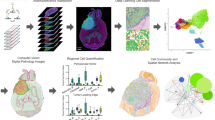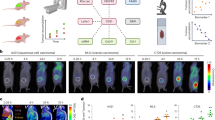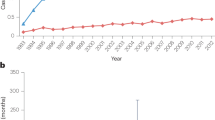Abstract
Proliferative activities in 181 primary Borrmann type 4 gastric carcinomas were investigated using percentage labelling of proliferating cell nuclear antigen (PCNA) and an argyrophilic nucleolar organiser region (AgNOR) count. Tumours with a high proliferative activity often metastasised to lymph nodes (P < 0.01), and these patients had a lower survival rate (P < 0.05). A significant correlation was recognised between the PCNA labelling percentage and AgNOR count (r = 0.452, P < 0.001). Cox's regression analysis showed that PCNA labelling percentage is an independent prognostic factor. These results indicate that estimating proliferative activity may be useful in predicting lymph node metastasis and patients' prognosis in cases of Borrmann type 4 gastric carcinoma.
This is a preview of subscription content, access via your institution
Access options
Subscribe to this journal
Receive 24 print issues and online access
$259.00 per year
only $10.79 per issue
Buy this article
- Purchase on Springer Link
- Instant access to full article PDF
Prices may be subject to local taxes which are calculated during checkout
Similar content being viewed by others
Author information
Authors and Affiliations
Rights and permissions
About this article
Cite this article
Kakeji, Y., Maehara, Y., Adachi, Y. et al. Proliferative activity as a prognostic factor in Borrmann type 4 gastric carcinoma. Br J Cancer 69, 749–753 (1994). https://doi.org/10.1038/bjc.1994.141
Issue Date:
DOI: https://doi.org/10.1038/bjc.1994.141
This article is cited by
-
Microvessel count, proliferating cell nuclear antigen and Ki-67 indices in gastric adenocarcinoma
Pathology & Oncology Research (2000)



